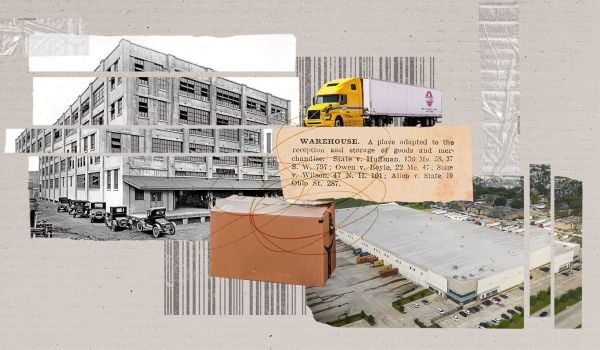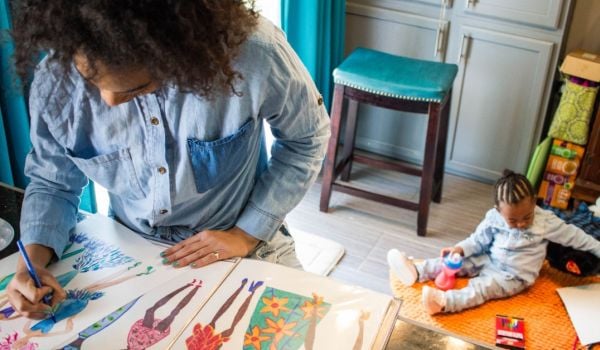When Sara Horowitz started the Freelancers Union in 2001, there was more than a hint of desperation and longing that clung to gig-based work. In the intervening dozen years, however, Horowitz has helped redefine the economy as one where not having a nine-to-six can be a blessing, where forgoing the benefits and protections associated with having one boss doesn’t have to mean going it alone. Now she’s hammering out a vision for the years ahead, which she calls “The New Mutualism.” In the 21st century, Horowitz argues, I will take a backseat to we. Whom you know will still reign supreme, but that’s because those will be the people with whom you’ll collaborate on projects, split the cost of office equipment, and commiserate over drinks at the end of a long day.
The Freelancers Union headquarters is a cavernous seventh-floor space in Brooklyn’s once-industrial DUMBO neighborhood, steps from the East River. There, amid hardwood floors and exposed pipes, and overlooking rows of workers, Horowitz explains what the future looks like to her. “Have you been to our medical practice?” she asks, pointing down Jay Street. There, about a mile south on a block that includes a deli, Hair 4 U (“Human Hair & Wigs”) and Downtown Shoe Repair, sits Freelancers Medical, a health clinic. Proceeds from the Union’s for-profit subsidiary, the Freelancers Insurance Company, pay the clinic’s bills. Services like primary care, yoga and stress release classes are free to insurance customers. “It’s the best thing we’ve ever done,” Horowitz says. At least, it demonstrates one of her articles of faith that doubles as a business best practice: “Plowing money back into the community.”
Horowitz, 50, has been at this a long time. Preceding the Freelancers Union was Working Today, which had its own six-year lifespan. But at this very moment, she says, “something is emergent,” even if “it’s only written about in the style section of any major paper.” Once the story was about the transition from agriculture to industrialism. Now it’s from work where the job was the organizing unit to something more discrete. That can be exciting: “It’s the exact opposite of ‘You’re on your own.’ It’s about ‘You’re interconnected.’” Anyway, she says, there’s no point in denying reality. The shift is happening. “I don’t mean to be giving any help to people who just want to destroy civil society,” Horowitz says. “But I don’t want us to not be prepared.”
It is, she says, in some ways a return to Old Labor, especially the days when any union worth its salt knew how to operate a good hall. “Liberals don’t know how to run things anymore,” says Horowitz, the daughter of a labor lawyer and a lawyer herself. “It’s kinda pathetic.” Where the Freelancers Union fits into that picture “should be an easy question,” but she admits she’s not totally sure. Next up is putting lessons from the Jay Street clinic to use in a second medical practice on Maiden Lane in Manhattan’s Financial District. At 7,200 square feet, the space will have even more room for classes and events. If the idea takes, the Union will explore opening “Freelancer Halls” in cities across the country. Driving her, Horowitz says, is the notion that even in an entrepreneurial economy, not everyone needs to be a well-oiled entrepreneur. Do what you’re good at. Figure out who can help with the rest.
Inspiration comes from places like northern Italy’s Emilia-Romagna and its abundant farm cooperatives. Farmers there know how to bring together their small collectives into bigger collectives to buy tractors, or “sophisticated intermediary organizations that interact with the market at different places,” in a way that Horowitz deems beautiful. Closer to home, “Portland is in another stratosphere,” and its people “occasionally they come down to earth and tell us things.” The trick is convincing the rest of us that there’s nothing alien about working collaboratively. “Americans don’t get it yet,” Horowitz says. “We have to harken back to older traditions to get there.” The Freelancers Union’s newsletter recently listed “11 Co-ops that You Didn’t Know Were Co-ops,” like True Value Hardware, which dates back to 1948; Ocean Spray, 1930; and the Associated Press, 1846.
“Both the left and the right keep individualizing us,” Horowitz says, “as if we’ve all become Reagan-Thatcherites.” She dismisses the notion that the only alternative is swing toward greater government dependence. “We’re a group, and we need to keep grouping people together, in a voluntary, easy-entry, easy-exit kind of way.” A good modern city mayor, then, is busily inventorying old buildings that can be retrofitted as community spaces, and creating platforms to connect would-be collaborators. Why can we have public agencies dedicated to supporting small businesses, Horowitz wonders, but not ones to teach people how to run cooperatives? “We need a force of stabilization that hears what people want and facilitates getting it. That’s what I think the role of government should be.”
At the moment, venture capitalist-backed companies like TaskRabbit, Uber and Airbnb carry the “shared economy” mantle. That makes some sense to Horowitz: “We’re at the period in time where we’re laying track across the West, right? And that was not going to be done by a non-profit.” But it frustrates her that others in the social sector aren’t scrambling to learn every possible lesson about competing in the market. It’s not, Horowitz says, enough to go to conferences and moan about inequities. “We can’t be mad at them. We have to be mad at ourselves,” she says. “Somebody has to get off their asses and do shit.”
“If our institutions aren’t there?” Horowitz says. “Good luck, freelancers.”

Nancy Scola is a Washington, DC-based journalist whose work tends to focus on the intersections of technology, politics, and public policy. Shortly after returning from Havana she started as a tech reporter at POLITICO.
















